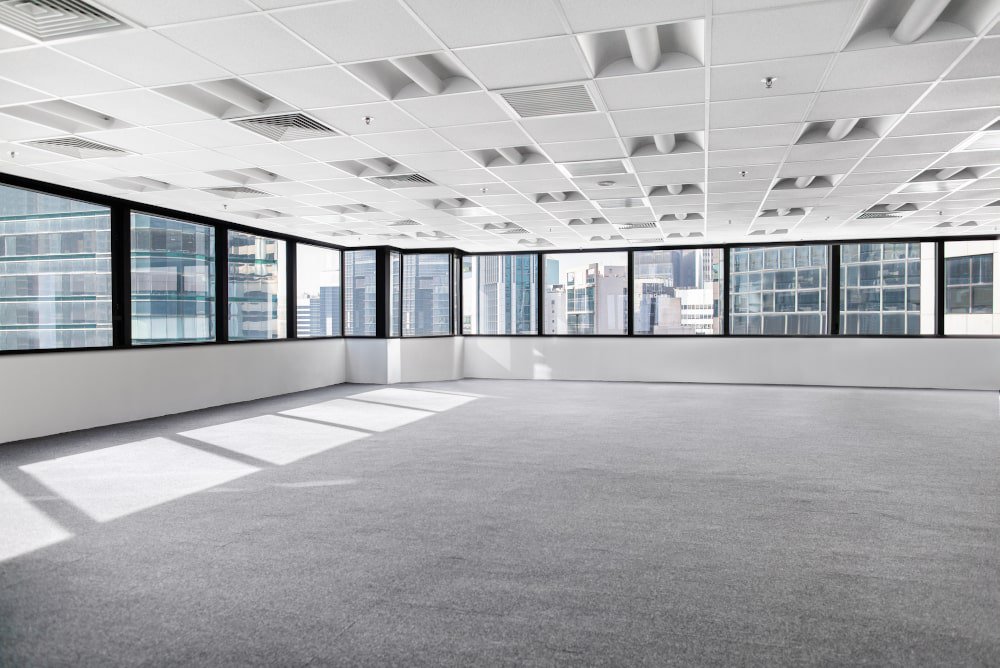Is Office Real Estate a Good Investment Move Again?

In recent times, the landscape of office real estate investment has undergone significant shifts, spurred by the widespread adoption of remote work following the COVID-19 pandemic. As the world began to return to normal, office real estate failed to bounce back to its pre-pandemic occupancy rates, with many employees and employers alike embracing hybrid work models. Now that the dust has settled, many investors are wondering: is office real estate a good investment move again in Canada?
How Remote Work Impacts Office Space Demand
The remote-work models developed during the lockdown stage of the COVID-19 pandemic encouraged employees to retreat from traditional offices in urban centres to offices in the comfort of their own bedrooms. The low cost of debt further fanned the metaphorical flames, as the BoC overnight lending rate dropped to just 0.75%, incentivizing urban renters to transition to suburban mortgages . While suburban migration was positively correlated to an increased quality of life during the pandemic, it has resulted in longer commute times post-pandemic, which in turn have eroded modern work-life-balance and job satisfaction metrics.
This prompted many businesses to reassess their office space needs, with many choosing to downsize their physical footprint. This shift has led to concerns about reduced demand for traditional office spaces. However, while the after-effects of the pandemic continue to influence office space utilization, it is unlikely to eradicate the need for physical workspaces entirely. Rather than removing our need for office spaces altogether, hybrid work models have simply shifted the market’s requirements.
In order to understand what this means, you first need to familiarize yourself with the classification system for office assets:
- Class A office assets: High-quality buildings in prime locations with modern amenities and infrastructure, typically commanding the highest rents and attracting prestigious tenants.
- Class B office assets: Mid-tier buildings that offer functional space and amenities but may have slightly older infrastructure or be located in less prestigious areas, resulting in lower rents compared to Class A properties.
- Class C office assets: Older or less desirable buildings with basic amenities and infrastructure, often located in less desirable neighborhoods and commanding the lowest rents among the three classes.
Although the office asset class has performed poorly in recent years, most losses in the sector can be attributed to Class B and Class C properties. While Class B and C rents have dropped since 2020, Class A rents have increased by 7.8%. This data further proves the notion that employers and employees still want to work in-person, but require spaces that are aestheically appealing, well-located, and full of convenient amenities.
Converting Office Spaces for Alternative Uses
While the demand for office space has evolved, it remains a fundamental component of the corporate ecosystem. To adapt to changing market dynamics, property owners and developers are exploring creative ways to repurpose underutilized office spaces. From converting vacant offices into residential units or mixed-use developments to transforming them into coworking spaces or innovation hubs, there is a growing trend towards diversifying the use of commercial properties.
Many companies turned to flexible offices in late 2020 as an alternative to traditional workplaces, especially as pandemic regulations began to loosen up. WeWork was a trailblazer in the emerging flex industry, but their success was short-lived, culminating in a Chapter 11 filing on November 6th, 2023. Many investors falsely attribute WeWork’s failure to a lack of demand for flexible workspaces, but this is not the case. WeWork’s bankruptcy resulted from a mismanagement of leasing relationships and an unsustainable business model, not from a lack of demand for their product offering.
By repurposing office spaces to align with emerging trends and community needs, investors can capitalize on evolving market opportunities and generate sustainable returns.
Leveraging Technology to Enhance Office Space Value
In an increasingly digital world, technology plays a pivotal role in enhancing the value proposition of office spaces. Smart building solutions, such as IoT sensors, advanced security systems, and energy-efficient infrastructure, not only improve operational efficiency but also enhance tenant experience and satisfaction. Moreover, technologies allowing for seamless integration of remote and hybrid employees into meetings, calls, and everyday work groups are a necessity in attracting tenants to an office property.
Evaluating Risk and Return in the Office Real Estate Sector
As with any investment, evaluating risk and return is crucial in the office real estate sector. While uncertainties surrounding remote work and economic recovery may introduce certain risks, they also present opportunities for savvy investors.
Looking ahead, it is clear that the trajectory of Canadian office real estate will continue to be shaped by the ability of developers to deliver not just spaces, but experiences that foster productivity, wellness, and sustainability for their tenants. The future outlook of Class A office spaces remains promising, albeit with a need for adaptable strategies that harmonize evolving trends with enduring principles of quality construction.
While flexible workspaces and residential conversions can serve as viable solutions to address rising Class B and C vacancy rates, they cannot entirely mitigate the macroeconomic headwinds expected to pressure the industry in the years to come. The best investments will come down to finding the right asset, at the right price, at the right time, and repositioning it to generate a favourable ROI. Ultimately, the most successful players in this rapidly evolving landscape will be those who embrace innovation, leverage technological advancements, prioritize sustainability, and consistently deliver high-quality office environments that cater to the evolving needs of occupants, and align with the aspirations of a dynamic market.
To learn more about investment opportunities and financing within the commercial real estate market, contact Clover Mortgage to schedule a free consultation today.
FAQ
Is office real estate a good investment?
Given recent market fluctuations, many Canadians are left to wonder: is commercial real estate a good investment right now? Office real estate in Toronto can be a promising investment due to the city's robust economy, steady population growth, and strong demand for office space. However, factors such as vacancy rates, rental yields, and economic trends should be carefully considered. In recent years, Toronto's office market has shown resilience despite economic fluctuations, making it an attractive option for investors seeking stable returns in the long term.
What is a good return on a commercial property?
In Toronto, a good return on commercial property typically ranges from 6% to 10%, although it can vary based on factors such as location, property type, and market conditions. According to recent data from the Toronto Real Estate Board, the average annual return on commercial properties in the Greater Toronto Area (GTA) has been around 8%, with some submarkets outperforming others due to higher demand and rental rates.
What commercial property has the highest ROI?
Within the commercial real estate market, multifamily apartment buildings have often demonstrated the highest ROI in Toronto due to strong rental demand driven by population growth and limited housing supply. According to a report by Altus Group, multifamily properties in Toronto achieved an average annual return of over 10% in recent years, outperforming other commercial property types such as office or retail. Additionally, industrial properties, particularly distribution warehouses, have seen increased demand and higher rental rates driven by e-commerce growth, making them another attractive option for investors seeking high ROI in Toronto's commercial real estate market.
Sources:





